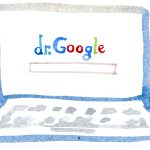 The healthcare industry has had a long and troubled history with ‘Dr Google’. On one hand, it’s great that we are empowered and enabled in finding out more information about our health and wellbeing, but on the other, the information we find can often do more harm than good, turning us into a nation of hypochondriacs.
The healthcare industry has had a long and troubled history with ‘Dr Google’. On one hand, it’s great that we are empowered and enabled in finding out more information about our health and wellbeing, but on the other, the information we find can often do more harm than good, turning us into a nation of hypochondriacs.
A recent paper suggests that the problems could run deeper than that. It explored how the information we find online influences our perception of the diagnosis given us by our doctor.
Trusted advice
The study recruited participants from Mechanical Turk, with each of them presented with a short vignette featuring a child who “has had a rash and worsening fever for 3 days.” The participants, who each had a child of their own, were then split into groups.
One group received a screen shot of information gleaned from the web describing symptoms of scarlet fever, a disease that causes rashes and fever. It’s a serious disease, and unless treated, it can quickly worsen, and in some instances result in heart damage.
A second group received similar information, but this time relating to Kawasaki disease, which occurs when blood vessels become inflamed throughout the body. It too is accompanied by fever and rashes, and again rapid treatment is necessary to prevent life-threatening complications.
The final group acted as the control group and received no information from the web at all.
After receiving different sets of information, all of the participants were then given the diagnosis of the doctor, which was that the child had scarlet fever. What’s interesting however is that the faith in that verdict varied considerably between the three groups.
In the control group, 81% of patients trusted the diagnosis, whilst 90.5% of those whose ‘research’ had agreed with the doctor did so. However, when the research differed from the diagnosis of the doctor, the trust plummeted to just 61%, with roughly the same number suggesting they would seek a second opinion.
Compromising trust
The authors believe their findings highlight a significant weakness in the availability of information online, and its impact on the trust between doctor and patient.
“The internet is a powerful information tool, but it is limited by its inability to reason and think,” they say. “Simply entering a collection of symptoms in a search engine may not reflect the actual medical situation at hand. These computer-generated diagnoses may mislead patients or parents and cause them to question their doctors’ medical abilities and seek a second opinion, thereby delaying treatment.”
What is interesting is quite how this might unfold given the spread of AI based symptom checkers onto the market. The recent panel I sat on at Health 2.0 had numerous symptom checkers on display, and whilst they all claim to offer fair and accurate diagnoses, their impact upon the patient-doctor relationship remains largely unexplored.
We are only going to be more likely to turn to digital tools as a first port of call when we suffer health issues, so it’s perhaps an issue that needs examining sooner rather than later.